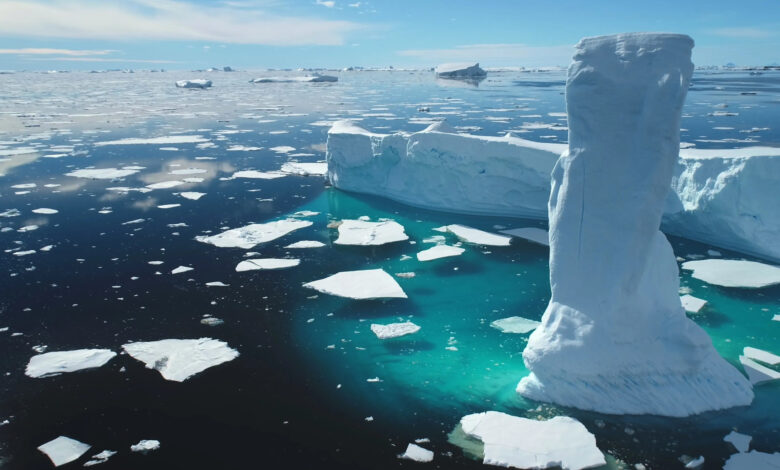
With global warming and the rapid melting of the world’s polar regions, new geoengineering ideas have been proposed to reduce the effects of climate change. One such idea is to build giant underwater curtains in Antarctica that would surround endangered glaciers. The purpose of this plan is to prevent the sea level from rising. However, in addition to scientific and technical challenges, the new idea has caused serious concerns about the emergence of political tensions and can ignite international political tensions like a spark.
An article published in the journal Nature in January 2024 has hypothetically investigated the new plan. According to this report, a floating curtain with a height of 100 meters and a length of 80 kilometers is attached to the sea floor and is stretched around the endangered areas, such as the West Antarctic Ice Sheet. Although the researchers admit they don’t know if the idea will work, they believe it is necessary to investigate it to prevent catastrophic sea level rise in the coming decades.
At the same time, another study recently published in the Journal of International Affairs warns that the implementation of such a project can fuel international political and legal disputes. Antarctica is a very special region politically. The Antarctic Treaty system, which was approved in 1959, prohibits any military activities, nuclear testing and mining in this continent.
Currently, seven countries, including Argentina, Australia, Chile, France, New Zealand, Norway and the United Kingdom, have made their territorial claims in this region. But these claims have been suspended based on the mentioned treaty. Despite some territorial overlaps, for example between Britain, Chile and Argentina, the treaty has so far prevented conflict over Antarctica.
The Antarctic ice sheet may be the target of sabotage or political and terrorist extortion
But the new study says the ice sheet project could upset the current fragile balance. Such a project may cause new disputes over the sovereignty and security of the region. Although the Antarctic Treaty has suspended territorial claims, it has not resolved them, leaving enough room for tension to arise. New activities, such as the giant curtain project, may be considered beneficial or detrimental to the interests of some countries and create new disputes.
Shibata Akihoan international law researcher from Kobe University in Japan and an author of the study, explains: “The article points to hidden political and legal aspects that are hidden behind the glamor of science and technology. We believe that experts should make decisions about the development of such technologies with full knowledge of these negative aspects.”
One of the main concerns raised in the article is that the structure may be targeted for sabotage or political and terrorist extortion. Researchers warn that even if such scenarios seem far-fetched, the existence of such a possibility can create significant security risks. To protect infrastructure, surveillance and security are needed, which can have political and military implications in Antarctica, which has never seen a war and is the only completely civilian point on Earth.
Researchers have taken a look at past disputes to investigate the possibility of managing crisis situations. For example, in the 1980s, there were serious discussions about the extraction of minerals in Antarctica. This issue was finally resolved with the approval of the Environmental Protection Protocol of the Antarctic Treaty in 1991. This protocol permanently banned any mining in this area.
read more
However, it may be too early to talk about such a project. The main reason for the melting of the glaciers and the increase in the sea level is climate change. But the international community has not been able to take an effective and coordinated action to deal with this crisis.
As the world enters a new era of heightened tensions, it seems unlikely that a massive engineering megaproject of this scale will be coordinated, let alone that the world will reach the geopolitical agreement necessary to avoid conflict.
The authors wrote in the article: “In the current situation, with the intensification of international competition and disputes between the world’s superpowers, achieving the necessary international cooperation to implement such a project seems highly unlikely.”








